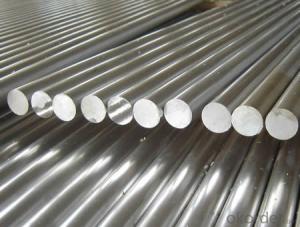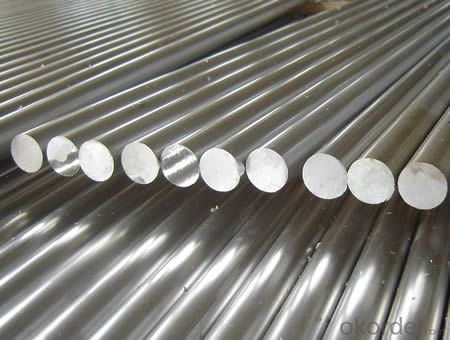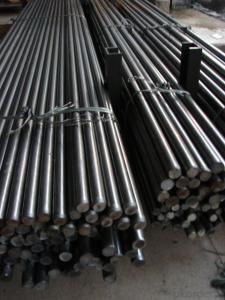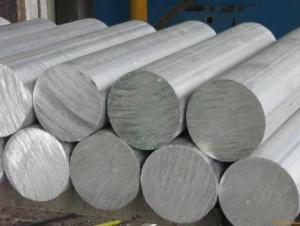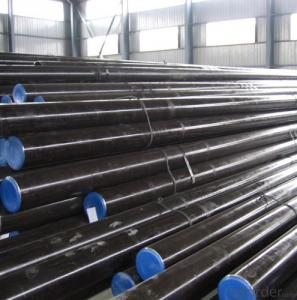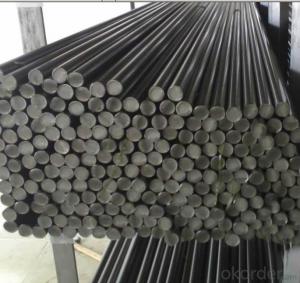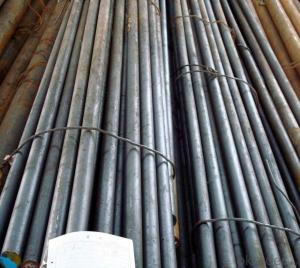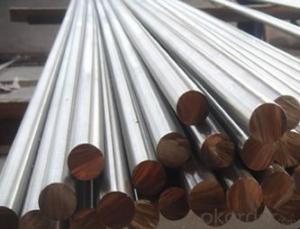High Quality Spring Steel Round Bar 18-25mm
- Loading Port:
- China main port
- Payment Terms:
- TT or LC
- Min Order Qty:
- 100 m.t
- Supply Capability:
- 10000 m.t/month
OKorder Service Pledge
OKorder Financial Service
You Might Also Like
High Quality Spring Steel Round Bar 18-25mm
Product Description:
Spring Steel can be divided into two types. One is carbon spring steel, and other one is alloy spring steel.
Alloy spring steel is based on carbon spring steel, by adding one or more alloying elements to improve the mechanical properties, hardenability and other properties to meet the requirement for manufacture all kinds of spring steel.
Specification of High Quality Spring Steel Round Bar 18-25mm:
-Material: 1065
-Standard: ASTM
-Production: Hot rolled or cold rolled
-Type: Spring Steel
| Diameter(mm) | Mass(kg/m) | Section(mm2) |
| 18 | 2.00 | 254.34 |
| 20 | 2.47 | 314 |
| 25 | 3.85 | 490.625 |
Corresponding Steel Grade of High Quality Spring Steel Round Bar 18-25mm for Reference:
USA, ASTM | CHN, GB/T | JPN, JIS | ISO |
1065 | 65 | SWRH67A SWRH67B | Type SC Type DC |
FRA, NF | GBR, BS | ||
C66D | C66D |
Chemical Composition of High Quality Spring Steel Round Bar 18-25mm:
C | Mn | Ni | Si |
0.62~0.70 | 0.50~0.80 | ≤0.30 | 0.17~0.37 |
P | S | Cr | Cu |
≤0.035 | ≤0.035 | ≤0.25 | ≤0.25 |
Mechanical Properties of High Quality Spring Steel Round Bar 18-25mm:
-Tensile Strength σb (MPa): ≥695
-Yield Strength σs (MPa): ≥410
-Elongation δ10(%): ≥10
-Percentage reduction of area: ψ (%): ≥30
-Hardness HBS, no heat treatment: ≤255
Usage/Applications of High Quality Spring Steel Round Bar 18-25mm:
-ASTM1065, is medium-high carbon spring steel. After heat treatment, this type of steel obtains high strength, hardness and elasticity but this material isn’t perfect for welding.
-Its fatigue strength is equal to alloy spring steel when they are in same configuration.
-For manufacturing spring, spring circle, all kinds of grommet, clutch, and axels in the production of normal machine.
Packaging & Delivery of High Quality Spring Steel Round Bar 18-25mm:
-Packing Detail: The products can be packed in bundles by steel wires.
-Marks: There are two types of marks. One is color mark and other one is tag mark. We paint color marks on both ends of bundles to make sure that it’s more convenient for customers to distinguish their products from other products at the destination port. The tag marks will be tied up to each bundle to make sure that customers know the specifications of each bundle like product’s name and size and other information of products.
-Delivery Detail:
1, Delivery time: 30~60 working days after receive buyer’s T.T. or L/C.
2, Delivery status should be written in the contract. (Heat treatment or no)
FAQ:
Q1: Why buy Materials & Equipment from OKorder.com?
A1: All products offered byOKorder.com are carefully selected from China's most reliable manufacturing enterprises. Through its ISO certifications, OKorder.com adheres to the highest standards and a commitment to supply chain safety and customer satisfaction.
Q2: How do we guarantee the quality of our products?
A2: We have established an advanced quality management system which conducts strict quality tests at every step, from raw materials to the final product. At the same time, we provide extensive follow-up service assurances as required.
Q3: How soon can we receive the product after purchase?
A3: Within three days of placing an order, we will arrange production. The shipping date is dependent upon the quatity, how many sizes you want and the plan of production, but is typically 1 month to 2 month days from the beginning of production.
Images of High Quality Spring Steel Round Bar 18-25mm:
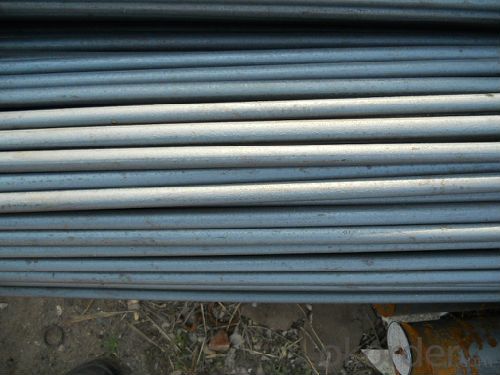
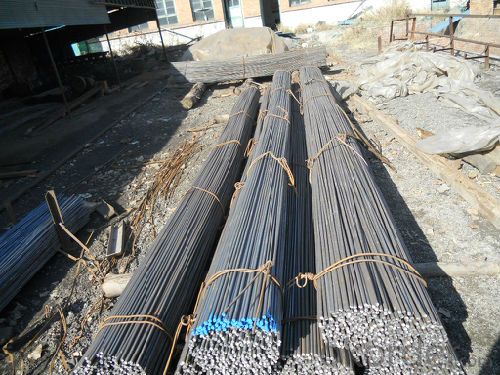
*If you would like to get our price, please inform us the size, standard/material and quantity. Thank you very much for your attention.
- Q: How does special steel perform in abrasive wear conditions?
- Special steel performs well in abrasive wear conditions due to its high hardness and toughness. It has excellent resistance to abrasion, which allows it to withstand the rubbing, scraping, and grinding that occurs in abrasive environments. The unique composition and heat treatment of special steel enhance its ability to resist wear and maintain its structural integrity, making it an ideal choice for applications where abrasive wear is a concern.
- Q: How does special steel perform in terms of creep resistance at elevated temperatures?
- Special steel is known for its excellent performance in terms of creep resistance at elevated temperatures. Creep refers to the gradual deformation of a material under constant stress at high temperatures over an extended period. Special steel, specifically designed to withstand high temperatures, demonstrates a remarkable ability to resist creep and maintain its structural integrity. The unique composition of special steel, which includes various alloying elements such as chromium, molybdenum, and vanadium, contributes to its exceptional creep resistance. These alloying elements enhance the steel's high-temperature strength, increase its resistance to deformation, and inhibit the formation of detrimental microstructural changes that can occur during creep. Furthermore, special steel undergoes specific heat treatment processes, such as quenching and tempering, which further enhance its creep resistance. These processes help refine the steel's microstructure, resulting in a fine-grained and homogenous material that can resist deformation even under prolonged exposure to high temperatures. The superior creep resistance of special steel makes it a preferred choice in various industries that operate under high-temperature conditions, such as power generation, petrochemical, and aerospace. It allows for extended service life, reduced maintenance, and increased safety in critical applications where failure due to creep deformation could have severe consequences. In summary, special steel exhibits exceptional performance in terms of creep resistance at elevated temperatures. Its unique composition, including alloying elements and specific heat treatment processes, enables it to resist deformation and maintain its structural integrity even under prolonged exposure to high temperatures.
- Q: How does special steel perform in high-pressure and high-temperature environments?
- Special steel is specifically engineered to excel in environments with high pressure and temperature. It possesses unique qualities that allow it to withstand extreme conditions without deforming, corroding, or failing. One of the main attributes of special steel is its exceptional strength. It is designed to have superior mechanical properties, including outstanding tensile strength. This enables it to resist the immense pressure exerted on it in high-pressure environments, ensuring that it maintains its structural integrity and does not buckle or collapse under the force. Furthermore, special steel is highly resistant to corrosion and oxidation, even at elevated temperatures. This resistance is crucial in high-temperature settings where hot gases, steam, or corrosive chemicals can cause regular steel to deteriorate rapidly. Special steel's ability to resist corrosion and oxidation ensures its longevity and reliability, making it an ideal choice for applications in challenging conditions. Additionally, special steel exhibits excellent heat resistance. It can endure extreme temperatures without compromising its mechanical properties, such as strength and hardness. This characteristic is vital in high-temperature environments where conventional steel would weaken, soften, or even melt. Special steel's capacity to maintain its structural stability even in extreme heat guarantees the safety and reliability of equipment and structures operating in such conditions. Moreover, special steel is renowned for its exceptional thermal conductivity. This property allows it to efficiently transfer heat away from the high-temperature environment, preventing localized hotspots and thermal stress. By effectively dissipating heat, special steel ensures the overall stability and performance of equipment and structures under high-pressure and high-temperature conditions. In conclusion, special steel excels in high-pressure and high-temperature environments due to its superior strength, resistance to corrosion and oxidation, heat resistance, and excellent thermal conductivity. These qualities make special steel a reliable and durable material for various applications, including power generation, oil and gas exploration, aerospace engineering, and many others.
- Q: How does special steel contribute to improving product reliability in critical applications?
- Special steel plays a crucial role in enhancing product reliability in critical applications due to its unique properties. Its exceptional strength, durability, and resistance to corrosion, heat, and wear enable it to withstand extreme conditions and stresses. This reliability ensures that critical applications, such as aerospace, automotive, and medical equipment, operate efficiently and safely. Additionally, special steel's high precision manufacturing capabilities allow for the production of complex components, further enhancing the performance and reliability of the final product.
- Q: What are the effects of different heat treatment processes on special steel?
- Different heat treatment processes have varying effects on special steel. Annealing, for example, helps to soften the steel and increase its ductility, making it easier to shape and work with. Hardening processes, such as quenching and tempering, increase the steel's hardness and strength, making it suitable for applications that require toughness and resistance to wear. Tempering, on the other hand, reduces the hardness of the steel while increasing its toughness. Additionally, heat treatment processes can also influence the steel's internal structure, such as the size and distribution of grains, which in turn affects its mechanical properties. Overall, the choice of heat treatment process can significantly impact the final characteristics of special steel, allowing for customization to meet specific performance requirements.
- Q: What is the significance of tensile strength in special steel?
- Tensile strength is of great significance in special steel because it determines the steel's ability to withstand stretching or pulling forces without breaking or deforming. This property is crucial in various industries, especially in manufacturing and construction, where high tensile strength is required for structural integrity and safety. Special steel with superior tensile strength can withstand heavy loads, resist impacts, and provide durability, making it highly sought after in applications such as building infrastructure, automotive manufacturing, and aerospace engineering.
- Q: How is special steel used in the power generation industry?
- Special steel is widely used in the power generation industry for various applications. It is utilized in the manufacturing of turbines, boilers, and other critical components due to its exceptional strength, heat resistance, and corrosion resistance properties. Special steel is crucial in ensuring the efficiency and reliability of power plants, enabling them to withstand high temperatures and pressures, while also minimizing downtime and maintenance costs.
- Q: What is the role of heat treatment in special steel?
- The role of heat treatment in special steel is to enhance its mechanical properties and improve its performance by altering its microstructure through controlled heating and cooling processes. This helps to achieve desired properties such as increased hardness, strength, toughness, and ductility, as well as improved wear resistance and corrosion resistance. Heat treatment also allows for the refinement of grain structure, elimination of internal stresses, and modification of the steel's crystalline structure, which ultimately improves the overall quality and usability of special steel in various applications.
- Q: What are the different welding methods used for special steel?
- There are several welding methods that can be used for special steel, depending on the specific requirements of the project. Some of the commonly used welding methods for special steel include: 1. Gas Metal Arc Welding (GMAW): Also known as MIG welding, this method uses a consumable electrode and a shielding gas to protect the weld from atmospheric contamination. GMAW is ideal for welding special steel as it provides high-quality, clean welds with minimal spatter. 2. Gas Tungsten Arc Welding (GTAW): Also known as TIG welding, this method uses a non-consumable tungsten electrode and a shielding gas to protect the weld. GTAW is often used for special steel as it allows for precise control over the welding process, resulting in high-quality, defect-free welds. 3. Shielded Metal Arc Welding (SMAW): Also known as stick welding, this method uses a consumable electrode coated in flux to protect the weld. SMAW is commonly used for special steel as it is a versatile and portable method that can be used in various positions and environments. 4. Flux-cored Arc Welding (FCAW): This method uses a tubular electrode filled with flux to protect the weld. FCAW is often used for special steel as it provides high deposition rates and deep penetration, making it suitable for thicker materials. 5. Submerged Arc Welding (SAW): This method uses a continuously fed wire electrode and a granular flux that is applied around the weld. SAW is commonly used for special steel as it can produce high-quality, high-integrity welds in thick sections. It is important to note that the selection of the appropriate welding method for special steel depends on various factors such as the type and thickness of the steel, the desired weld quality, and the specific application requirements. Therefore, it is recommended to consult with welding professionals or engineers to determine the most suitable method for a particular project involving special steel.
- Q: How is low alloy steel used in the manufacturing of pressure vessels?
- Low alloy steel is commonly used in the manufacturing of pressure vessels due to its superior strength, toughness, and resistance to corrosion. It provides the necessary structural integrity and durability required to withstand high pressure and temperature conditions, ensuring the safety and reliability of the vessel. Additionally, low alloy steel allows for cost-effective fabrication while meeting the stringent requirements of pressure vessel codes and standards.
Send your message to us
High Quality Spring Steel Round Bar 18-25mm
- Loading Port:
- China main port
- Payment Terms:
- TT or LC
- Min Order Qty:
- 100 m.t
- Supply Capability:
- 10000 m.t/month
OKorder Service Pledge
OKorder Financial Service
Similar products
Hot products
Hot Searches
Related keywords
